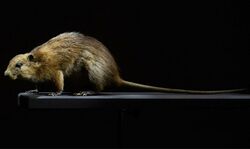Biology:Megalomys desmarestii
| Megalomys desmarestii | |
|---|---|

| |
| Stuffed specimen | |
| Scientific classification | |
| Domain: | Eukaryota |
| Kingdom: | Animalia |
| Phylum: | Chordata |
| Class: | Mammalia |
| Order: | Rodentia |
| Family: | Cricetidae |
| Subfamily: | Sigmodontinae |
| Genus: | †Megalomys |
| Species: | †M. desmarestii
|
| Binomial name | |
| †Megalomys desmarestii (J. Fischer, 1829)
| |
Megalomys desmarestii, also known as the Martinique muskrat,[2] Desmarest's pilorie,[3] or the Martinique giant rice rat,[1] is an extinct rice rat from Martinique in the Caribbean.
Description
It was among the largest species of West Indian rice rats, as big as a cat, and was one of the first Caribbean mammals to become extinct during the 20th century.[2] It may have been semi-aquatic, as it was known to escape into the sea when pursued by predators, but it never swam away from the island.[4]
Extinction
It was common on Martinique until the end of the 19th century, when attempts were made to exterminate it because it was considered to be a pest of the island's coconut plantations. It was also hunted for food; however, due to its strong musky odor, this was uncommon. On 8 May 1902, the volcano Mount Pelée erupted, completely destroying the island's principal city of Saint-Pierre. It has been speculated that the rice rat became extinct then or during a later eruption in 1902, but predation by introduced small Indian mongooses is more likely to have been the primary cause of its extinction.[1]
References
- ↑ 1.0 1.1 1.2 Turvey, S.T.; Helgen, K. (2017). "Megalomys desmarestii". IUCN Red List of Threatened Species 2017: e.T12980A22377057. doi:10.2305/IUCN.UK.2017-3.RLTS.T12980A22377057.en. https://www.iucnredlist.org/species/12980/22377057. Retrieved 18 November 2021.
- ↑ 2.0 2.1 Watts, David. 1990. The West Indies: Patterns of Development, Culture, and Environmental Change Since 1492. Cambridge University Press ISBN:0-521-38651-9
- ↑ Musser, G.G. and Carleton, M.D. 2005. Superfamily Muroidea. Pp. 894–1531 in Wilson, D.E. and Reeder, D.M. (eds.). Mammal Species of the World: a taxonomic and geographic reference. 3rd ed. Baltimore: The Johns Hopkins University Press, 2 vols., 2142 pp. ISBN:978-0-8018-8221-0
- ↑ Flannery, T. and Schouten, P. 2001. A Gap in Nature: Discovering the World's Extinct Animals. Atlantic Monthly Press, New York. ISBN:0-87113-797-6
Wikidata ☰ Q1765848 entry
 |



